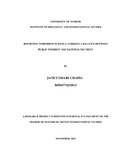| dc.description.abstract | Terrorism still remains a major threat to Kenya‟s national-security interests. Reporting security matter, especially terrorism is not only complex but tedious activity that endangers the life of journalists. However, efforts to combat the menace are hampered by an insufficient legal framework. Previously, terrorism-related offenses were primarily handled under the provisions of the penal code, with the result that offenders received lenient sentences or even were acquitted. On the other hand, efforts to formulate specific counterterrorism legislation in the past were met with criticism from human-rights bodies, the clergy, legal bodies, and the public at large. The overall objective of the study was to explore ways in which the media while reporting on terrorism in Kenya is able to strike a balance between public interest and protecting national security. The following were the specific objectives that guide the study: To look at the various ways in which the media coverage of terrorism can compromise national security; to find out whether the media can and is used as tool to propagate the agenda of terrorists and to determine how the media can objectively report on terrorism while safeguarding national interests. The study was based on liberalism theory which is founded on two main tenets. The principle of individualism where a special emphasis is placed on the individual in the society and the second principle is that of freedom. The researcher aimed to test the following hypothesis: Media in Kenya can strike a balance between public interest and national security when reporting terrorism and media in Kenya cannot strike a balance between public interest and national security when reporting terrorism. This study adopted qualitative and quantitative research design. The researcher used both primary data and secondary collection techniques. The study included administration of questionnaires to the respondents and interviews guided by structured open-ended and closed questions. Qualitative and quantitative analysis methods were used so as to gauge the different variables and how they affect the dependent variables. The study established that media and the government have common interests in seeing that the media are not manipulated into promoting the cause of terrorism or its methods, it also established that freedom of expression is a fundamental, it is universally accepted that it may legitimately be subjected to restriction on various grounds by the Government. The study concludes that ensuring national security is a fundamental precondition to safeguard human rights including freedom of expression, Counterterrorism may unavoidably be incompatible with human rights as fighting terrorism necessarily involves the state taking on new powers of surveillance and enforcement. The study recommends that the government should be the hard-nosed defenders of security and freedom because both are vital to nation's well-being. Everyone should be permanently vigilant and never stop thinking hard about how to protect our security and freedom as society and circumstances change. | en_US |

